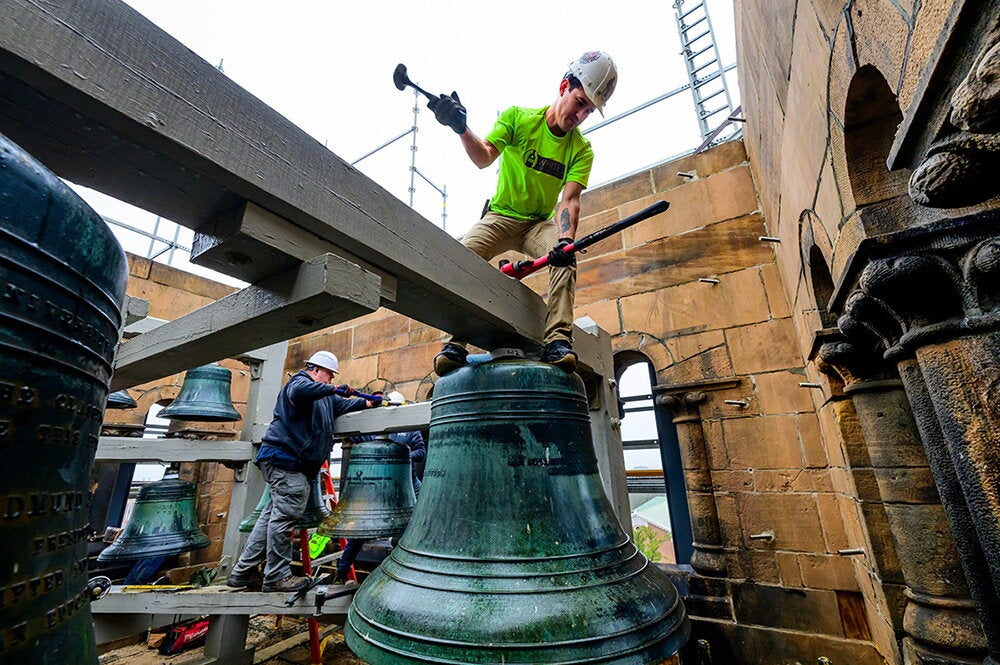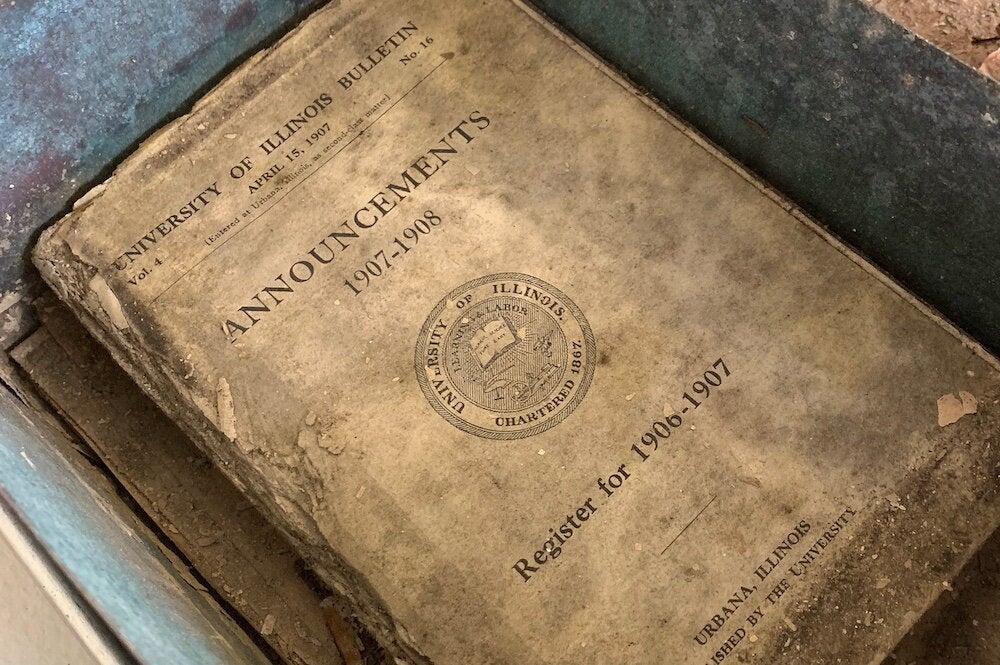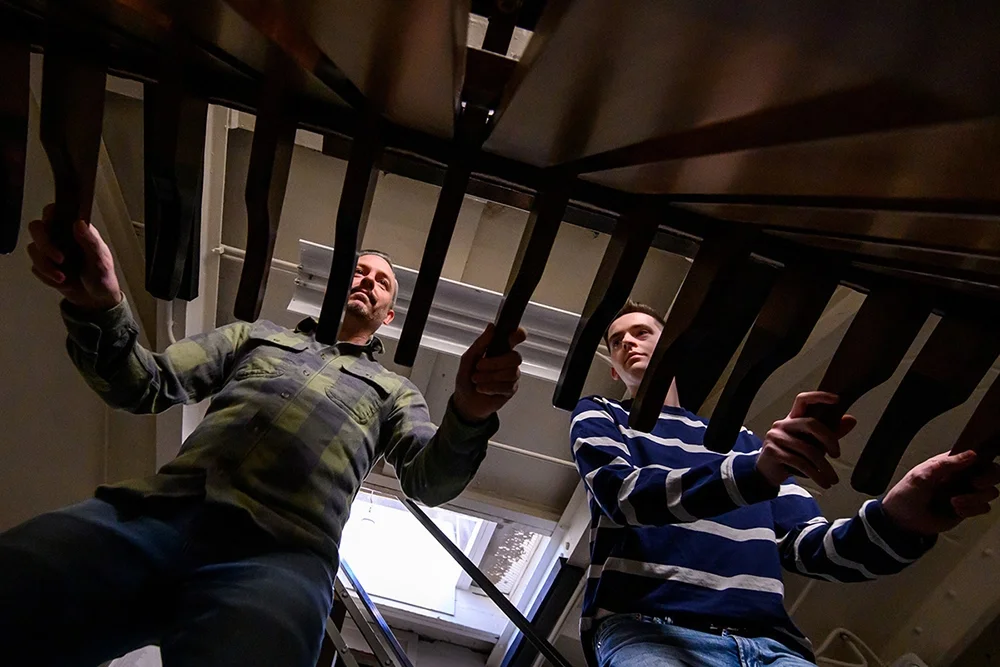
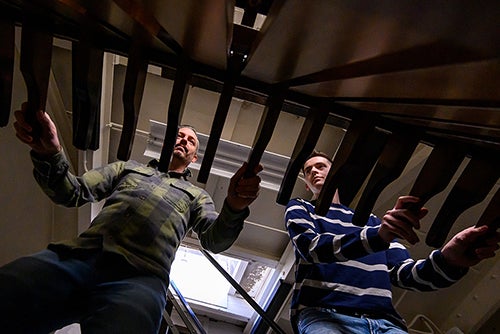
Early on a sunny Sunday morning, the chimes tower in Altgeld Hall is filling up with people. Students climb the steep staircase to the tower, several of them carrying snacks. They are all chimes players who will perform for a recording of chimes music.
Chimesmaster Michael Broussard, a doctoral student in ethnomusicology, is coordinating the recording session. He’s on his cell phone with sound engineer Graham Duncan, who is on the ground outside Altgeld. Duncan and an assistant are setting up studio microphones on stands between the Alma Mater statue and the Illini Union to record the chimes.
Soon, a renovation of Altgeld Hall will begin and the chimes players won’t have access to the tower to play while it and the belfry are updated. Broussard was looking for a project to keep people interested in the bells during the renovation, and he and the other players decided to make a recording of their music.
“It is a preservation project – something for future chimes players and community members to enjoy,” Broussard says.
More than a dozen players agreed to play, and they are here on a Sunday morning to record when fewer extraneous sounds outside, such as traffic or people walking by, might be heard on the recording.
Watch a video of the recording here.
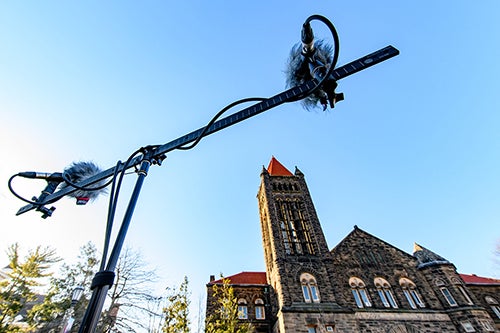
Prior to this recording session, Duncan conducted test recordings of the bells in various spots around Altgeld, finding the best place to capture the sound.
“It’s such a large, unique instrument,” says Duncan, who usually records in a studio or indoor performance space. “We’re listening for a balance of the bell sounds. Once they’re struck, they just keep ringing through the performance. Sometimes the smaller bells can be sort of shadowed acoustically by the larger bells.”
Because the sound of the bells continues to resonate after they are struck, Duncan can’t do the kind of post-production editing he usually does for recordings of performances.
“It has to be a perfect take, because we can’t go back and fix things,” he says.
The wind is another factor to consider, and the day is breezy when the recording begins.
Broussard plays the first song – “Hail to the Orange.”
“I like how I play it,” he says. “Some players play it really fast, and I like to play it pretty slow.”
When Broussard finishes playing, Duncan tells him the wind gusted a bit at the end of the song.
“It reminded me of a crowd roaring,” Duncan says.
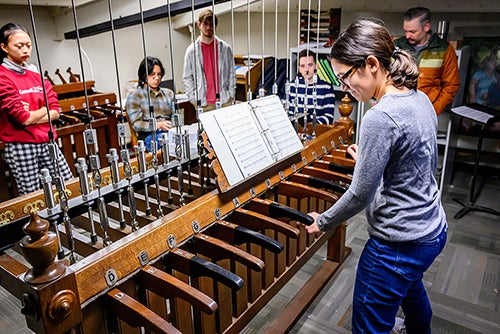
Broussard says that some environmental noise is desirable with a chimes recording, since the bells are heard from outdoors.
“I’m fine with a little ambient noise in my recordings. It’s campus life,” says Tina Horton, a former chimesmaster who came down from Chicago to play for the recording.
Even so, Duncan asks the players to wait several times while buses or motorcycles pass by. The recording also pauses while people cheer on a group of runners along Green Street. The wind increases throughout the morning and the musicians must wait through some strong gusts before resuming their playing.
In addition to “Hail to the Orange,” the recording also will include “Illinois Loyalty,” “Oskee Wow Wow” and the “Three-in-One.” Joseph Kim plays the “Three-in-One.” He’s one of only two current chimes players to attempt the song in recent years. It is quite difficult to play, he says, and it is one of the longest songs recorded today.
Each player selected his or her own music for the recording, including classical pieces and folk tunes.
“We want the students to show their sense of belonging and identity through the music. We’re making this for the community, but we want the chimes players to express their individuality,” Broussard says.
He and Horton were members of a gamelan group before playing the chimes, and they play a duet of a Balinese song, “Tabuh Selisir,” that they adapted for the bells. Their two parts combine to create the melody, with the duet relying heavily on the chemistry between the performers, Broussard says.
Artharv Gudi, a sophomore studying math and German, plays a south Indian piece that was composed in the 11th century. The music wasn’t written down, so Gudi wrote out his own improvised version of the song.
Liam Flood, a former chimes player, plays an Irish hornpipe song called “Off to California” – his signature song. He’s arranged several traditional Irish music compositions for the chimes. This one is particularly fun for him to play because it’s very fast and physical for the player.
“It’s a single line of melody, and the exciting part is to play it as fast as you possibly can,” he says.
Flood flew in from Washington, D.C., to play for the recording.
“There’s no price I wouldn’t pay to come back and participate,” he says.
Flood is the unofficial historian for the chimes. He says the only other chimes recording is a 1947 vinyl recording by WILL radio that he found archived online.
As the playing and recording go on throughout the morning, more players arrive. Even after they finish playing, many linger in the tower, watching others play, applauding after each song and soaking up their time with the bells.
Editor’s note: The Altgeld Chimes music from the recording session will be made available on CDs and digitally soon. Visit our webpage celebrating the chimes for updates and more information.
